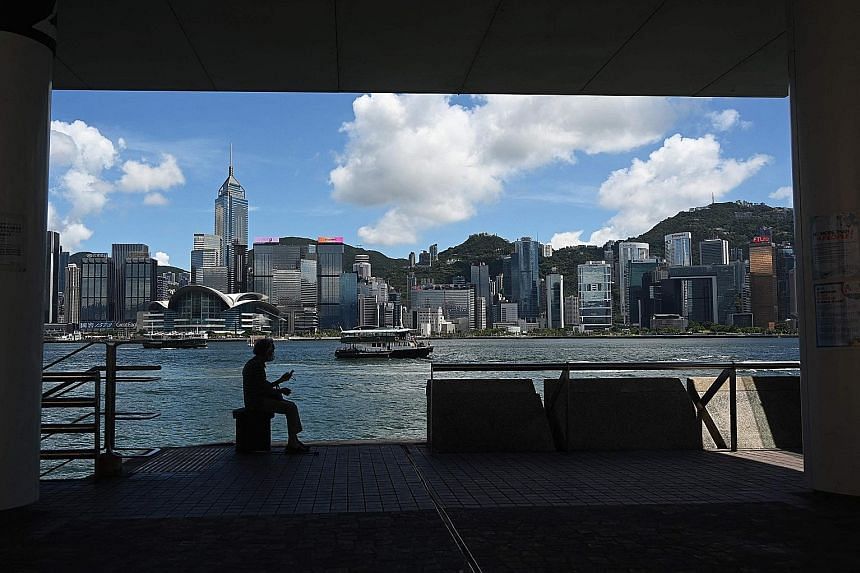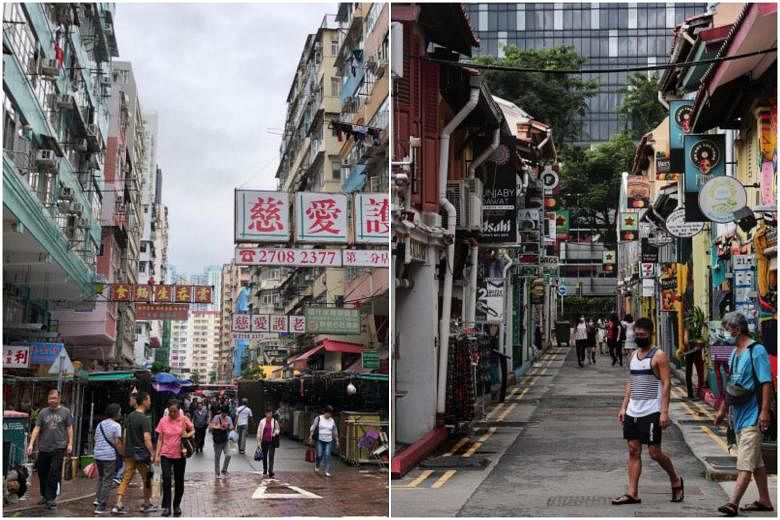HONG KONG - The renamed quarantine-free travel corridor plan between Hong Kong and Singapore has hit another snag after months of delay.
An announcement on the arrangement, previously known as the air travel bubble, was originally expected on Tuesday (July 13) but was scrapped at the last minute on Monday, The Straits Times understands.
Under the updated deal, both Singapore and Hong Kong were to make it compulsory for passengers taking designated flights to be fully vaccinated against Covid-19.
But the plan is now up in the air after some Hong Kong lawmakers on Friday pushed for the deal to be scrapped.
Legislators, including Ms Alice Mak of the Federation of Trade Unions and Mr Michael Tien, had urged the government to scrap the plan as Singapore shifts from a zero-infection strategy, which Hong Kong places great importance on.
They reason that having zero coronavirus cases is a requirement for the territory to reopen borders with the Chinese mainland.
Under Singapore's transition from dealing with Covid-19 as a pandemic to managing it as endemic, its Government aims to fully inoculate two-thirds of the country's 5.7 million population by early August.
As at last Saturday, about 69 per cent of Singapore's residents had received at least one dose of a Covid-19 vaccine - more than double the figure two months earlier. Meanwhile, 40 per cent of Singapore's residents had received both doses and completed the regime.
The rationale for the switch in strategy is that the virus is here to stay and society will have to live with it. But with vaccination, the transmission rate of the virus falls and, more importantly, fewer people get seriously sick if infected.
The Commerce and Economic Development Bureau said in a reply to ST that "the two governments have been maintaining communication and reviewing the epidemic situation of the two places".
It added that an announcement will be made in due course if there are further arrangements.
A spokesman for Singapore's Ministry of Transport, in response to media queries, also said on Tuesday: "Both Singapore and Hong Kong are continuing discussions and will provide an update in due course."
Respiratory diseases expert Leung Chi Chiu of the Hong Kong Medical Association said that while Hong Kong cannot afford to shut its borders forever, the key question is when and how to reopen.
"Whether we can reopen with Singapore depends on whether there is a net importation risk into Hong Kong. If Singapore is going to abandon the zero transmission policy, and at risk of having local Delta variant transmission, the answer may be obvious," he said.
Dr Leung pointed out two reasons for this.
First, the Delta variant is highly transmissible and the exponential rebound in countries such as Britain and the Netherlands - places with high vaccination coverage - points to a qualitative difference between having no source of infection and a few infectious sources.
The latter, he said, can turn into a devastating wave in a matter of weeks.
Second, Hong Kong is not primed to reopen its borders given its slow and low vaccination take-up rate.
Dr Leung said that with low vaccination coverage among the elderly in Hong Kong, it does not have "the necessary condition to reopen to areas" with a Covid-19 incidence that is hundreds of times or tens of thousands of times that of Hong Kong.
"However, as we have largely cleared local transmission last month, we are ready to explore reopening borders with areas that can keep zero transmission," he added.
So far, about 35 per cent of the city's 7.5 million residents have taken at least the first dose of a vaccine, while 24 per cent have received two jabs.
Epidemiologist Ben Cowling, a professor at the University of Hong Kong, believes that "population immunity" rather than vaccination coverage is the more relevant metric since immunity can come from vaccines or natural infections.
Even with high vaccine coverage, Britain is expecting more than a million cases in the next one to two months after it reopens, he noted, adding that ending on-arrival quarantines will lead to community spread of Covid-19 sooner or later.
"Quarantine-free cross-border travel with the mainland would stimulate the local economy in Hong Kong and I can envisage we might synchronise our Covid-19 strategy with the strategy on the mainland.
"In other words, perhaps Hong Kong will continue with its zero-Covid strategy and plan to eventually drop quarantines and Covid-19 measures at the same time as the mainland," Prof Cowling said.
But pressure has been mounting on businesses, particularly those in the aviation, hospitality and retail sectors, which have been hit hard by the pandemic.
Domestic businesses also continue to suffer, as head of the Hong Kong General Chamber of Commerce George Leung remarked in June.
Urging people to get vaccinated, he told local media that Hong Kong is a small and externally oriented economy, so the territory will suffer more than other cities if its borders remain closed and normal business activities cannot resume.

In an interview with Bloomberg TV last week, Singapore Health Minister Ong Ye Kung expressed optimism for the travel plan with Hong Kong to materialise.
"With very low Covid-19 case counts, or none at all on many days, the cities are well-positioned to open their borders again," Mr Ong said.
"That gives us common ground to talk again about restarting the air travel bubble."
But he added: "I try to not call it 'bubble', as it connotes something very fragile and can easily burst - I try to describe it as 'air travel corridor' now, but the idea is the same."
The Hong Kong-Singapore travel scheme was slated to launch last November but was postponed to May after Hong Kong had a surge in cases.
It was derailed again when the number of coronavirus cases began to rise in Singapore, with the situation stabilising in early June.
Additional reporting by Toh Ting Wei


